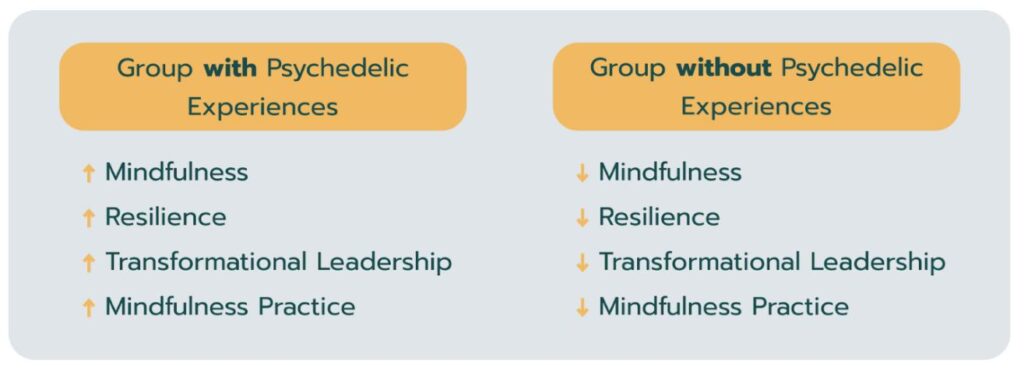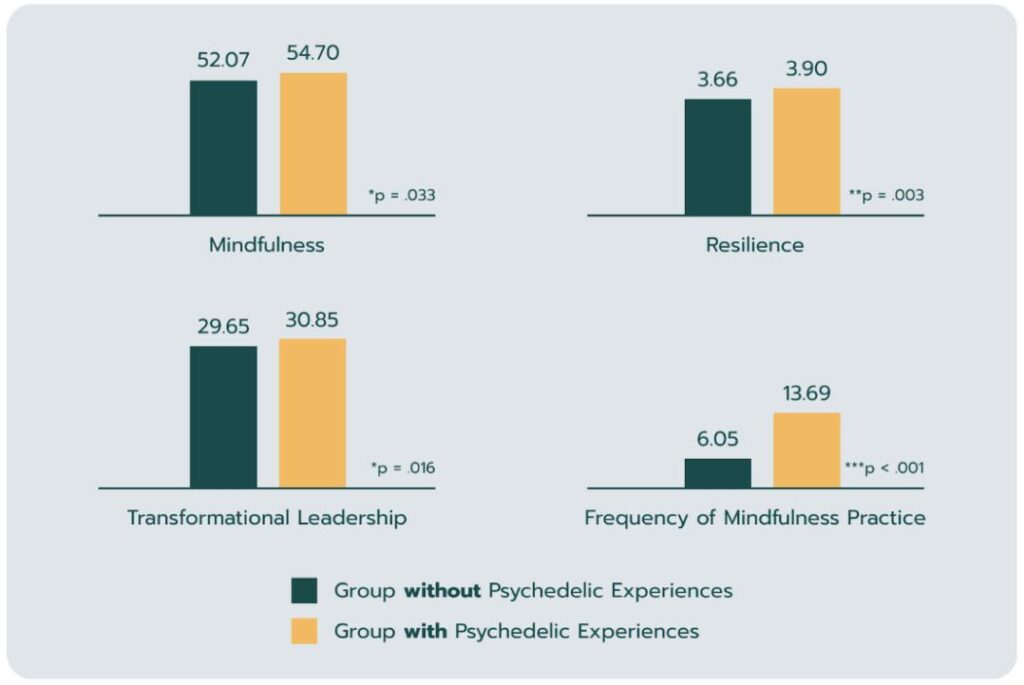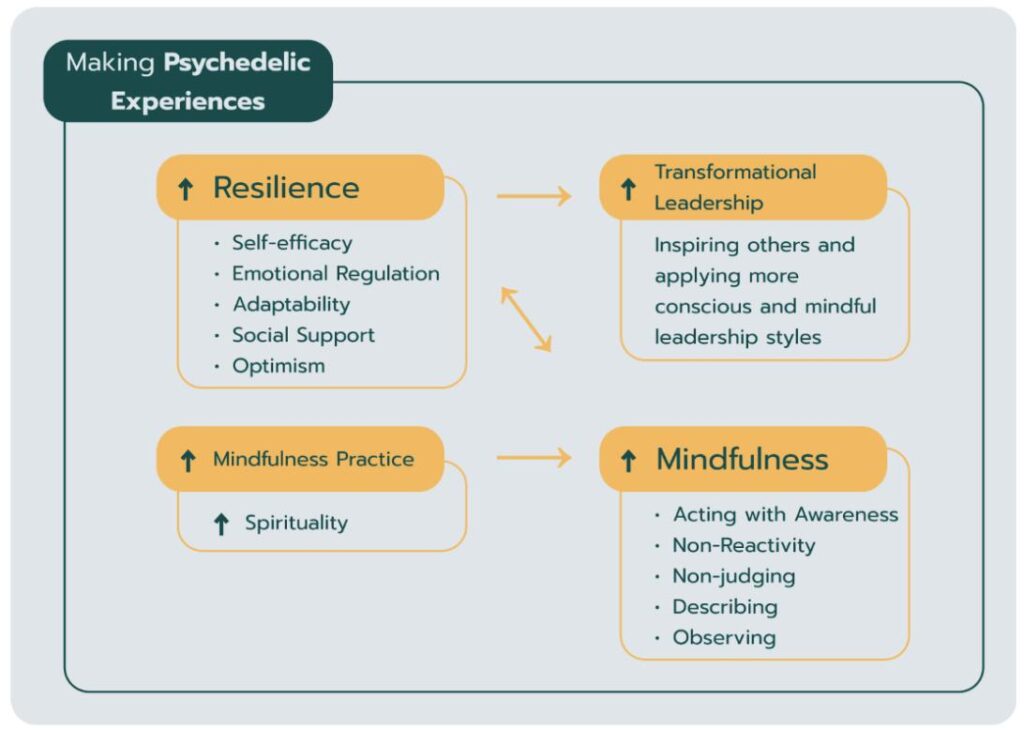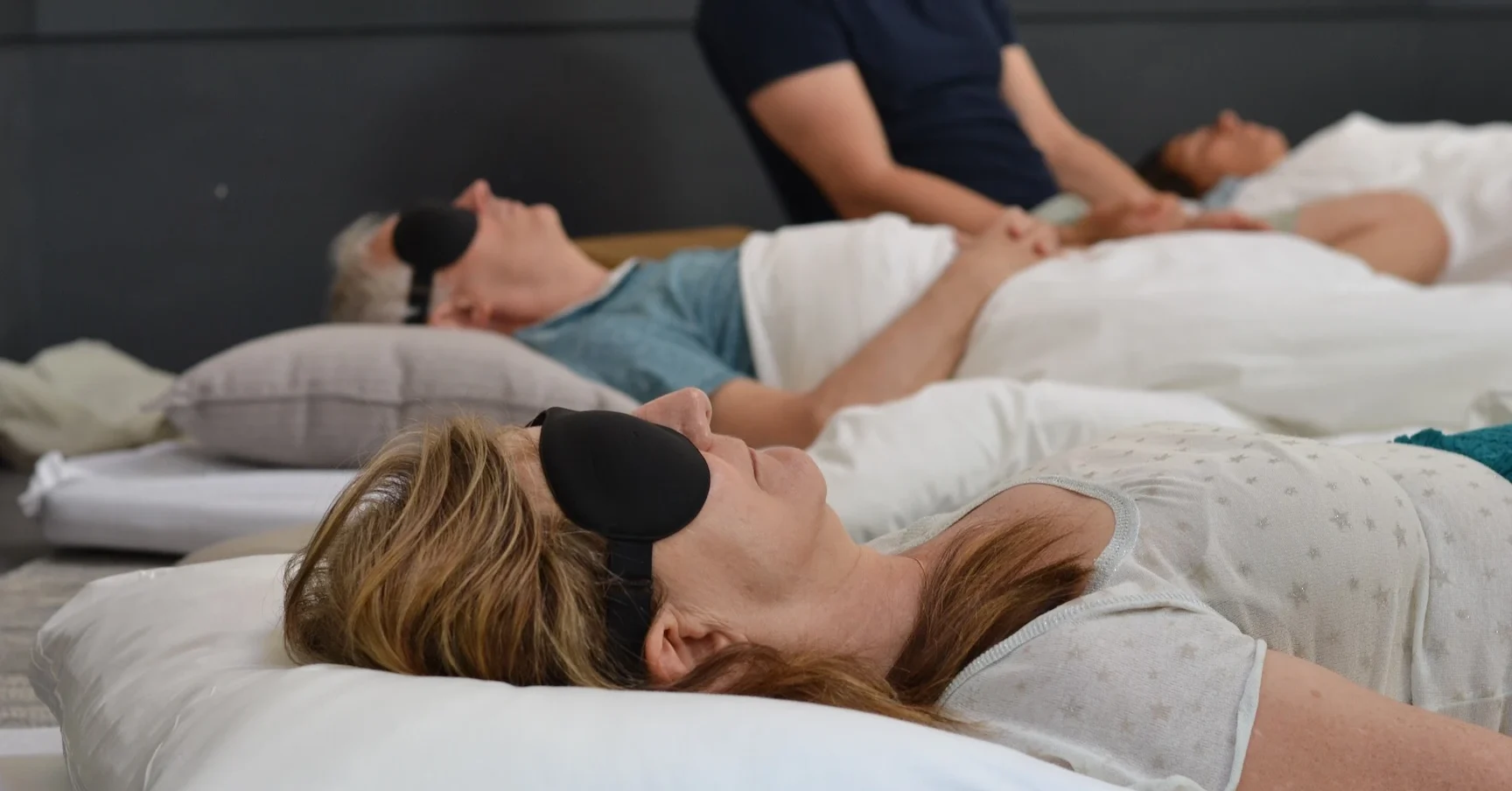
Dr. Stephanie Schoss
Contributing Authors
Dmitrij Achelrod PhD

Aliza Janzen-Lympius
Aliza is a research associate at the Institute for Sustainability Psychology at Leuphana Universität in Lüneburg, Germany. Aliza holds a Master’s degree in Business Psychology from NORDAKADEMIE Graduate School and a Bachelor in Business Administration and Engineering from Leuphana Universität.

Dr. Stephanie Schoss
This study was conducted in collaboration between Aliza Janzen-Lympius, currently a doctoral candidate in Sustainability Psychology at Leuphana Universität, Prof. Stephanie Schoss, Director at the Hochschule St. Gallen Executive School of Management, and Dr. Dmitrij Achelrod from Evolute Institute.
The Evolving Landscape of Leadership
Leadership today isn’t just about making strategic decisions or managing teams; it’s evolving into a deeply human endeavor. More than ever, effective leadership requires emotional intelligence, authentic relationships, and the capacity to inspire teams through uncertain times. As entrepreneurs navigating the complexities of modern business, you’re probably already familiar with mindfulness and resilience – two essential competencies for leaders aiming for sustained personal and organizational growth.
But what if there’s an unexpected way to enhance these critical leadership skills? Could experiences that alter our consciousness – specifically psychedelic experiences – actually help leaders become more mindful, resilient, and effective?
Our team, including Aliza Janzen-Lympius from Leuphana University as the main investigator, Professor Stephanie Schoss from the University of St. Gallen, and Dr. Dmitrij Achelrod from Evolute Institute, tackled this intriguing question head-on. We wanted to explore if and how altered states of consciousness might shape leadership behaviors, competencies, and personal resources, with a particular focus on mindfulness and resilience.
We began by diving deep into existing research, affirming that mindfulness allows leaders to better regulate emotions, manage stress, and navigate complex challenges with empathy and adaptability. Coupled with resilience — the capacity to recover quickly from setbacks and remain flexible under pressure — these qualities form the backbone of contemporary leadership.
Yet, emerging anecdotal evidence and preliminary studies suggest that psychedelic experiences, conducted responsibly and safely, might significantly amplify these leadership qualities. Many individuals who’ve had such experiences describe a profound sense of interconnectedness, enhanced self-awareness, and increased compassion—attributes directly aligned with mindful, resilient leadership.
To investigate this promising connection, we conducted an extensive empirical study, surveying over 200 leaders about their personal experiences. Our aim was clear: to uncover how controlled psychedelic experiences might influence essential leadership behaviors, deepen competencies like mindfulness, and strengthen resilience in a rapidly evolving professional landscape.
Here’s what we found:
- Mindfulness is Essential for Leadership: Mindfulness serves as a core competency for effective, strategic, and conscious leadership, enhancing self-awareness and decision-making.
- Resilience Fuels Adaptability: Resilient leaders thrive in uncertainty, fostering creativity and innovation as they navigate dynamic environments and complex challenges.
- Psychedelic Experiences Show Promising Benefits: Leaders who have undergone controlled psychedelic experiences report improved leadership skills, enhanced personal resources, and more effective coping mechanisms.
- Strong Link Between Psychedelics and Resilience: The beneficial relationship between psychedelic experiences and resilience remains strong even when accounting for factors like age, personality, and mindfulness practices.
- Conscious Leadership Thrives on Mindfulness and Resilience: Leaders who practice mindfulness and resilience are better equipped to provide personalized support, mentorship, and foster positive, productive relationships within their teams.
The Connection of Psychedelics and Leadership
Mindfulness, Resilience, … and Psychedelics? New Insights for Leaders
Previous research indicates that individuals experience higher mindfulness after psychedelic experiences (Goldberg et al., 2020; Madsen et al., 2020; Mans et al., 2021; Radakovic et al., 2022; Smigielski et al., 2019). Furthermore, increased resilience, greater optimism, and higher self-esteem have been observed in people using psychedelics (Liu et al., 2022-08, 2022; Mans et al., 2021). In accordance with those results, our study revealed several key findings regarding the relationships between psychedelic experiences (PEs), mindfulness, resilience, and transformational leadership specifically in leaders.
| HOW DO LEADERS “DO PSYCHEDELICS”? | |
| Of the 88 leaders who have made psychedelic experiences before ... | |
| Professionally Guided | 39.8% have attended a psychedelic retreat or workshop. |
| Spiritually Prepared | 34.5% took part in specific preparations prior to the experience. |
| Popular Substances | 79.5% used Psilocybin and 52.3% used LSD. |
| Comfortable Surroundings | Most experiences took place at home (36.8%) and with friends (57.5%). |
| HOW DO LEADERS PRACTICE MINDFULNESS? | |
| Of the 142+ leaders who practice mindfulness ... | |
| Daily Practice | 21 minutes per day. |
| Monthly Practice | 11.5 days per month. |
| Experience | 8.33 years of average experience in mindfulness practice. |
| Engagement | With high engagement during the practice. |
Mindfulness Enhanced Through Psychedelic Experiences
Firstly, our study reveals something striking: leaders who’ve explored altered states of consciousness consistently rank higher on mindfulness, bounce back faster from setbacks (are more resilient), and are the more transformational leaders. These gains can’t be chalked up to personality quirks or heightened spirituality only; we controlled for those factors and the edge still held. They also walk the talk. Even six months or more after a psychedelic journey, these leaders weave mindfulness practices into their routines more often than peers who haven’t taken the trip. In fact, having prior psychedelic experiences, along with openness and spirituality, explains nearly a third (30.4%) of the difference we see in ongoing mindfulness practice.
What is Transformational Leadership?
Transformational leadership is about inspiring others through vision, values, and personal example. Instead of focusing on rewards and control (“transactional leadership”), it builds trust, motivation, and growth — for both leaders and their teams.
The concept is often used in research as a key indicator of positive leadership styles because it captures core qualities like inspiration, ethical behavior, and personal growth that define people-centered leadership today.
In this study, we used a transformational leadership scale as an outcome to measure how psychedelic experiences — possibly via increased mindfulness and resilience — support more purpose-driven, growth-oriented leadership.
Secondly, we found mindfulness practice to be a significant predictor of leader everyday mindfulness, which just means that practicing mindfulness more often makes you more mindful, generally. While this comes as no surprise, it speaks to the relevance of mindfulness practice in everyday life, regardless of the experimentation with psychedelic experiences. We also found a close connection of a person’s mindfulness and spirituality.
Thirdly, our deeper dive showed a clear chain of effects: psychedelic experiences fortify a leader’s resilience, the flexibility with which they withstand stress and bounce back from challenges, which in turn fosters a more transformational leadership style. Specifically, the enhanced self-efficacy, emotional regulation, and adaptability are what powers truly transformational leadership. A similar ripple effect shows up with mindfulness. A psychedelic journey makes leaders more likely to stick with everyday mindfulness practices, and that consistent habit raises their baseline level of calm, focused awareness, also called trait-mindfulness.
Combining previous research and the results of our study we propose the following model to illustrate the connections of psychedelic experiences, mindfulness, resilience, and leadership:
Finally, our findings also highlighted the strong connection between resilience and mindfulness, showing that mindfulness can strengthen a person’s resilience and a higher resilience also furthers the ability to be more mindful. This interconnection of the two was previously demonstrated by various researchers, which lends credibility to our results. Making psychedelic experiences can (!) play an additional part in this bigger picture, but is definitely not a ‘quick fix’ for more mindfulness, resilience, or even improved leadership-skills.
Quick Summary of the Studies’ Results
- Higher Mindfulness Scores – Leaders with psychedelic experiences engaged more frequently in mindfulness practice and displayed higher spirituality, fostering more present moment awareness. This allows them to be more conscious, strategic, and resilient in their leadership.
- Increased Resilience – Leaders with psychedelic experiences showed higher levels of psychological resilience, enabling them to navigate dynamic environments and to lead people through uncertainties.
- More Transformational Leadership – Leaders with psychedelic experiences demonstrated stronger transformational leadership qualities, fostered by resilience.
So What? How Psychedelic Experiences Enrich Leadership
Psychedelic Experience and Leaders’ Personal Development
Our results highlight how psychedelic experiences can positively impact essential leadership competencies, beyond mindfulness practice. These positive connections between psychedelic experiences, mindfulness, and resilience suggest that well-prepared and guided psychedelic interventions complement traditional mindfulness and resilience training methods, like meditation, breathing exercises or body scans. Meanwhile, psychedelic experiences should not replace regular mindfulness practices, nor should they be the first measure taken, but they are an additional option to further ones own personal and professional growth and to find more gratification in mindfulness practice.
Mindfulness and Resilience are Foundational to Strategic Leadership
We identified mindfulness and resilience as foundational elements of strategic leadership, influencing traits such as self-reflection, stress resistance, emotional regulation, and adaptability — key skills needed in the dynamic and complex environments of high level leadership.
Organizational Support for a More Conscious Leadership
Based on our findings, we encourage leaders and organizations to nurture mindfulness and resilience through programs like MBSR and resilience workshops, creating stress-resilient, adaptable teams and cultures. Conscious and mindful leadership approaches are crucial in contemporary work settings, prioritizing ethical values and individual strengths to foster healthier work environments and sustainable leadership philosophies.
Conclusion
Our study highlights the importance of mindfulness and resilience in leadership, as well as drawing connections to the positive impacts psychedelic experiences can have on individuals. We demonstrated the usefulness of mindfulness practice for leaders, especially in dynamic, complex, and uncertain environments. We have also shown that psychedelic experiences have a valuable role to play in this, with a demonstrated link to higher resilience and enhanced mindfulness practice.
Background
If you are a science nerd, continue reading: we wrote the following chapters to offer more in-depth descriptions of the theoretical underbelly of our research, research process, and results.
Theory: Results of the Literature Review
Mindfulness and Resilience: a strong foundation
Beyond traditional skills like strategic thinking and decision-making, emotional intelligence, self-awareness, and resilience have emerged as critical leadership traits. Effective leadership is now defined by fostering innovation, collaboration, and adaptability. This shift underscores the diminishing importance of rigid leadership styles in favor of social and interpersonal skills, such as empathy and a deep understanding of employee needs (Boyar et al., 2022; Eichenauer et al., 2022; Esenyel, 2024; Latukha et al., 2024; Wang et al., 2021; S. Zaccaro et al., 2012; S. J. Zaccaro et al., 2018). Psychological and emotional stability, coupled with strong interpersonal skills, are paramount. Resilience—the ability to recover from adversity—is a key determinant of a leader’s capacity to manage stress, adapt, and maintain team morale during crises (Slaymaker et al., 2023; S. J. Zaccaro et al., 2018). However, achieving this calm and strategic state requires a foundation of self-awareness and presence, making mindfulness a vital resource.
Mindfulness, the practice of focused, present-moment awareness, has proven invaluable in modern leadership. It enables leaders to stabilize their mental health and interact with their teams with greater empathy and presence (Zhou et al., 2022).
Mindfulness cultivates … (Zhou et al., 2022)
- Enhanced emotional regulation: Leading to more balanced, less impulsive decisions and reactions.
- Reduced stress and burnout: Enabling effective workload and stress management.
- Improved interpersonal relationships: Fostering trust and attentive listening.
- Positive coping strategies: Promoting effective self-regulation and perspective decentralization.
Mindful leaders are better able to adapt to the needs of their employees, de-escalate conflicts and foster relationships. They thus present a more authentic and constructive leadership style (Zhou et al., 2022).
Resilience complements mindfulness, enabling leaders to:
- Bounce back quickly from adverse situations or setbacks.
- Maintain focus and motivation during difficult times.
- Adapt flexibly to changing environments.
- Inspire confidence and stability.
These qualities are central to transformational leadership, which emphasizes vision, inspiration and personal growth (Bass, 1999; Burns, 1978; Hoch et al., 2018). But how can leaders effectively cultivate these essential qualities? In addition to classic meditation, yoga, and mindfulness workshops, more unconventional methods are emerging from the field.
The Potential of Psychedelic Experiences
The resurgence of research into psychedelic substances like psilocybin, LSD, and ayahuasca has revealed their potential in treating mental health conditions such as depression, anxiety, OCD, and addiction (Aday et al., 2020; Bogenschutz et al., 2015; Carhart-Harris et al., 2016, 2018; Goldberg et al., 2020; Griffiths et al., 2016; Johnson et al., 2014; Johnson & Griffiths, 2017; Moreno et al., 2006; Ross et al., 2016; Thomas et al., 2013). Beyond therapeutic applications, these substances have demonstrated positive effects on healthy individuals, including:
- Increased well-being and improved mental health (Griffiths et al., 2006, 2008, 2018; Haijen et al., 2018; Kettner et al., 2021; MacLean et al., 2011; Madsen et al., 2020; Mans et al., 2021; Schmid & Liechti, 2018).
- Enhanced optimism, confidence, and positive affect (Mans et al., 2021).
- Heightened spirituality and social connectedness (Goldberg et al., 2020; Griffiths et al., 2006, 2008, 2018; Madsen et al., 2020; Schmid & Liechti, 2018; Smigielski et al., 2019).
- Increased mindfulness (Goldberg et al., 2020; Madsen et al., 2020; Mans et al., 2021; Radakovic et al., 2022; Smigielski et al., 2019).
Many individuals who have undergone controlled psychedelic experiences report feeling more connected to themselves, others, and the world around them (Griffiths et al., 2018; Kettner et al., 2021; Schmid & Liechti, 2018). This heightened sense of awareness and interconnectedness may contribute to the development of leadership traits such as compassion, adaptability, and decision-making as well as mindfulness and resilience.
While the therapeutic applications of psychedelics are well-documented, their potential role in personal development remains largely unexplored by academic research. This article presents findings from a study investigating the link between psychedelic experiences, mindfulness, resilience and leadership, aiming to illuminate how altered states of consciousness may influence leader behaviors, competencies, and resources.
Research Design: Investigating the Link Between Psychedelics and Leadership
A cross-sectional online survey was conducted with 212 leaders, including 88 individuals who had prior psychedelic experiences. The survey assessed various psychological factors, including mindfulness levels, resilience scores, and transformational leadership behaviors.
Why a cross-sectional design?
With this design researchers can deduce correlations and connections that are occurring in the “real world”. Cross-sectional studies are often done in an effort to capture a comprehensive snapshot of a diverse population at a point in time. This approach was ideal for examining potential relationships between psychedelic experiences and leadership qualities, as it allowed efficient data collection from a larger sample (212 leaders) across multiple variables simultaneously. By revealing naturally occurring patterns without manipulating variables—which would be ethically and practically challenging when studying psychedelic use—this method provides valuable insights into how these experiences might relate to mindfulness, resilience, and transformational leadership behaviors in authentic leadership contexts.
The participants of the study were on average 47.18 years old, with a roughly equal gender distribution (53.6% male) and 78.6% graduated from a university. In the analysis only people who stated to have leadership experience were included, 49% of those stated to be C-level executives, directors, owners, entrepreneurs or in senior management.
In this study the following scales were used to assess the key variables.
- Leader Mindfulness: Five-Facet-Mindfulness-Questionnaire (FFMQ-15, Baer et al., 2006).
- Resilience: 5×5-Resilience-Scale (DeSimone et al., 2017).
- Transformational Leadership: Global-Transformational-Leadership-Scale (GTLS, Carless et al., 2000).
Results: Assessing Psychedelic Experiences and Mindfulness Practice
Of the 212 leaders questioned 41.5% (88 people) stated to have had psychedelic experiences before. Of those 39.8% (35) have had those experiences at a psychedelic workshop or retreat. Roughly a third of the people with psychedelic experiences took part in specific preparation rituals before the experience.
Most psychedelic experiences, were made with the classic psychedelics Psilocybin (79.5%) and LSD (52.3%), at a home (36.8%) or in nature (20.7%), with friends (57.5%) or professional supervision (27.6%). With that most of the sample that indicated to have participated in psychedelic experiences didn’t neatly follow the recommendations for consuming psychedelics safely and to optimize the experience and desired results. Still most of the participants felt very safe in their experience.
Due to communication and acquisition of the sample most of the participants were highly interested and invested in mindfulness practice. The average participant of the study practiced mindfulness for 8.33 years, 11.5 days a month and on these days on average for 21 minutes. On a scale of 1 (not at all engaged) – 5 (highly engaged) participants reported an average high engagement of 4.05.
Contribution to Research and Limitations of the Study
This study significantly contributes to leadership and psychedelics research by bridging these fields for the first time. It integrates mindfulness, resilience, and leadership into a unified model, examining their relationships with psychedelic experiences in leaders. The findings offer new perspectives on the interaction of these variables and provide key insights for advancing theoretical models.
While these findings offer valuable insights into the relationships between the studied variables, it is important to acknowledge certain limitations.
- No causal assumptions can be made. The cross-sectional nature of the study design, while enabling the collection of a bigger more representative sample, precludes definitive conclusions about causality.
- Self report scales show only one side of the coin. The reliance on self-report data may have introduced bias, such as social desirability bias.
- Details of the psychedelic experience vary. While the collection of diverse experiences enables more external validity, the psychedelic experiences differ greatly between the participants and are not always up to the recommendations for safe use. Though this would only skew data towards more negative results and suggests that even bigger effects could be seen when properly preparing, guiding and integrating the experience.
Bibliography
Aday, J. S., Mitzkovitz, C. M., Bloesch, E. K., Davoli, C. C., & Davis, A. K. (2020). Long-term effects of psychedelic drugs: A systematic review. Neuroscience & Biobehavioral Reviews, 113, 179–189. https://doi.org/10.1016/j.neubiorev.2020.03.017
Baer, R. A., Smith, G. T., Hopkins, J., Krietemeyer, J., & Toney, L. (2006). Using self-report assessment methods to explore facets of mindfulness. Assessment, 13(1). https://doi.org/10.1177/1073191105283504
Bass, B. M. (1999). Two decades of research and development in transformational leadership. European journal of work and organizational psychology, 8(1), 9–32. https://doi.org/10.1080/135943299398410
Bogenschutz, M. P., Forcehimes, A. A., Pommy, J. A., Wilcox, C. E., Barbosa, P. C. R., & Strassman, R. J. (2015). Psilocybin-assisted treatment for alcohol dependence: a proof-of-concept study. Journal of psychopharmacology, 29(3), 289–299.
Boyar, S. L., Savage, G. T., & Williams, E. S. (2022). An adaptive leadership approach: The impact of reasoning and emotional intelligence (EI) abilities on leader adaptability. Employee Responsibilities and Rights Journal, 34(4), 291–305. https://doi.org/10.1007/s10672-022-09428-z
Burns, J. M. (1978). Leadership. Free Press.
Carhart-Harris, R. L., Bolstridge, M., Rucker, J., Day, C. M., Erritzoe, D., Kaelen, M., Bloomfield, M., Rickard, J. A., Forbes, B., Feilding, A., Taylor, D., Pilling, S., Curran, H. V., & Nutt, D. J. (2016). Psilocybin with psychological support for treatment-resistant depression: An open-label feasibility study. The Lancet Psychiatry, 3(7), 619–627. https://doi.org/10.1016/S2215-0366(16)30065-7
Carhart-Harris, R. L., Erritzoe, D., Haijen, E., Kaelen, M., & Watts, R. (2018). Psychedelics and connectedness. Psychopharmacology, 235(2). https://doi.org/10.1007/s00213-017-4701-y
Carless, S. A., Wearing, A. J., & Mann, L. (2000). A short measure of transformational leadership. Journal of Business and Psychology, 14(3). https://doi.org/10.1023/A:1022991115523
DeSimone, J. A., Harms, P. D., Vanhove, A. J., & Herian, M. N. (2017). Development and validation of the five-by-five resilience scale. Assessment, 24(6). https://doi.org/10.1177/1073191115625803
Eichenauer, C. J., Ryan, A. M., & Alanis, J. M. (2022). Leadership during crisis: An examination of supervisory leadership behavior and gender during COVID-19. Journal of Leadership & Organizational Studies, 29(2), 190–207. https://doi.org/10.1177/15480518211010761
Esenyel, V. (2024). Evolving leadership theories: Integrating contemporary theories for VUCA realities. Administrative Sciences, 14(11), 270. https://doi.org/10.3390/admsci14110270
Goldberg, S. B., Shechet, B., Nicholas, C. R., Ng, C. W., Deole, G., Chen, Z., & Raison, C. L. (2020). Post-acute psychological effects of classical serotonergic psychedelics: a systematic review and meta-analysis. Psychological Medicine, 50(16), 2655–2666. https://doi.org/10.1017/S003329172000389X
Griffiths, R. R., Johnson, M. W., Carducci, M. A., Umbricht, A., Richards, W. A., Richards, B. D., Cosimano, M. P., & Klinedinst, M. A. (2016). Psilocybin produces substantial and sustained decreases in depression and anxiety in patients with life-threatening cancer: a randomized double-blind trial. Journal of Psychopharmacology, 30(12), 1181–1197. https://doi.org/10.1177/0269881116675513
Griffiths, R. R., Johnson, M. W., Richards, W. A., Richards, B. D., Jesse, R., MacLean, K. A., Barrett, F. S., Cosimano, M. P., & Klinedinst, M. A. (2018). Psilocybin-occasioned mystical-type experience in combination with meditation and other spiritual practices produces enduring positive changes in psychological functioning and in trait measures of prosocial attitudes and behaviors. Journal of Psychopharmacology (Oxford, England), 32(1). https://doi.org/10.1177/0269881117731279
Griffiths, R. R., Richards, W. A., Johnson, M. W., McCann, U. D., & Jesse, R. (2008). Mystical-type experiences occasioned by psilocybin mediate the attribution of personal meaning and spiritual significance 14 months later. Journal of Psychopharmacology (Oxford, England), 22(6). https://doi.org/10.1177/0269881108094300
Griffiths, R. R., Richards, W. A., McCann, U., & Jesse, R. (2006). Psilocybin can occasion mystical-type experiences having substantial and sustained personal meaning and spiritual significance. Psychopharmacology, 187(3). https://doi.org/10.1007/s00213-006-0457-5
Haijen, E. C., Kaelen, M., Roseman, L., Timmermann, C., Kettner, H., Russ, S., & Carhart-Harris, R. L. (2018). Predicting responses to psychedelics: a prospective study. Frontiers in Pharmacology, 9(1), 897. https://doi.org/10.3389/fphar.2018.00897
Helmold, M. (2022). Leadership: Gegenstand und definition. In Leadership. Springer Gabler. https://doi.org/10.1007/978-3-658-36364-2_1
Hoch, J. E., Bommer, W. H., Dulebohn, J. H., & Wu, D. (2018). Do ethical, authentic, and servant leadership explain variance above and beyond transformational leadership? A meta-analysis. Journal of Management, 44(2), 501–529. https://doi.org/10.1177/0149206316665461
Johnson, M. W., Garcia-Romeu, A., Cosimano, M. P., & Griffiths, R. R. (2014). Pilot study of the 5-HT2AR agonist psilocybin in the treatment of tobacco addiction. Journal of psychopharmacology, 28(11), 983–992.
Johnson, M. W., & Griffiths, R. R. (2017). Potential therapeutic effects of psilocybin. Neurotherapeutics : the journal of the American Society for Experimental NeuroTherapeutics, 14(3). https://doi.org/10.1007/s13311-017-0542-y
Kettner, H., Rosas, F. E., Timmermann, C., Kärtner, L., Carhart-Harris, R. L., & Roseman, L. (2021). Psychedelic communitas: Intersubjective experience during psychedelic group sessions predicts enduring changes in psychological wellbeing and social connectedness. Frontiers in Pharmacology, 12, 623985. https://doi.org/10.3389/fphar.2021.623985
Latukha, M., Yakovleva, P., & Yan, K. (2024). Adaptive leadership for multilevel resilience in the context of disruptions. Thunderbird International Business Review. https://doi.org/10.1002/tie.22416
Liu, X., Wang, Q., & Zhou, Z. (2022-08, 2022). The association between mindfulness and resilience among university students: a meta-analysis. Sustainability, 14(16), 10405. https://doi.org/10.3390/su141610405
MacLean, K. A., Johnson, M. W., & Griffiths, R. R. (2011). Mystical experiences occasioned by the hallucinogen psilocybin lead to increases in the personality domain of openness. Journal of Psychopharmacology, 25(11), 1453–1461. https://doi.org/10.1177/0269881111420188
Madsen, M. K., Fisher, P. M., Stenbæk, D. S., Kristiansen, S., Burmester, D., Lehel, S., & Knudsen, G. M. (2020). A single psilocybin dose is associated with long-term increased mindfulness, preceded by a proportional change in neocortical 5-HT2A receptor binding. European Neuropsychopharmacology, 33(1), 71–80. https://doi.org/10.1016/j.euroneuro.2020.02.002
Mans, K., Kettner, H., Erritzoe, D., Haijen, E. C. H. M., Kaelen, M., & Carhart-Harris, R. L. (2021). Sustained, multifaceted improvements in mental well-being following psychedelic experiences in a prospective opportunity sample. Frontiers in Psychiatry, 12. https://doi.org/10.3389/fpsyt.2021.647909
Moreno, F. A., Wiegand, C. B., Taitano, E. K., & Delgado, P. L. (2006). Safety, tolerability, and efficacy of psilocybin in 9 patients with obsessive-compulsive disorder. Journal of clinical Psychiatry, 67(11), 1735–1740.
Radakovic, C., Radakovic, R., Peryer, G., & Geere, J.-A. (2022). Psychedelics and mindfulness: a systematic review and meta-analysis. Journal of Psychedelic Studies, 6(2), 218–230. https://doi.org/10.1556/2054.2022.00218
Ross, S., Bossis, A., Guss, J., Agin-Liebes, G., Malone, T., Cohen, B., & Su, Z. (2016). Rapid and sustained symptom reduction following psilocybin treatment for anxiety and depression in patients with life-threatening cancer: a randomized controlled trial. Journal of Psychopharmacology, 30(12), 1165–1180. https://doi.org/10.1177/0269881116675512
Schmid, Y., & Liechti, M. E. (2018). Long-lasting subjective effects of LSD in normal subjects. Psychopharmacology (Berl), 235(2), 535–545. https://doi.org/10.1007/s00213-017-4733-3
Slaymaker, R. R., O’Byrne, K. K., & Williams, P. E. (2023). The influence of socio-cognitive mindfulness and resilience on middle managers’ stress and thriving during COVID-19: results from two studies. Journal of Management Development, 42(1), 54–75. https://doi.org/10.1108/jmd-05-2022-0112
Smigielski, L., Kometer, M., Scheidegger, M., Krähenmann, R., Huber, T., & Vollenweider, F. X. (2019). Characterization and prediction of acute and sustained response to psychedelic psilocybin in a mindfulness group retreat. Scientific Reports, 9(1), Article number: 14914. https://doi.org/10.1038/s41598-019-50612-3
Thomas, G., Lucas, P., Capler, N. R., Tupper, K. W., & Martin, G. (2013). Ayahuasca-assisted therapy for addiction: Results from a preliminary observational study in canada. Current Drug Abuse Reviews, 6(1), 30–42. https://doi.org/10.2174/15733998113099990003
Wang, Z., Guan, C., Cui, T., Cai, S., & Liu, D. (2021). Servant leadership, team reflexivity, coworker support climate, and employee creativity: a multilevel perspective. Journal of Leadership & Organizational Studies, 28(4). https://doi.org/10.1177/15480518211010769
Zaccaro, S. J., Green, J. P., Dubrow, S., & Kolze, M. (2018). Leader individual differences, situational parameters, and leadership outcomes: A comprehensive review and integration. The Leadership Quarterly, 29(1), 2–43. https://doi.org/10.1016/j.leaqua.2017.10.003
Zaccaro, S., LaPort, K., & José, I. (2012). The attributes of successful leaders: a performance requirements approach. In M. G. Rumsey (Hrsg.), The oxford handbook of leadership. Oxford University Press. https://doi.org/10.1093/oxfordhb/9780195398793.013.0002
Zhou, Y., Wang, C., & Sin, H.-P. (2022). Being “there and aware”: a meta-analysis of the literature on leader mindfulness. European Journal of Work and Organizational Psychology, 32(3), 299–316. https://doi.org/10.1080/1359432X.2022.2150170

Patrick Liebl,
Lead Facilitator & Integration Expert
Curious to learn more?
We invite you to schedule a call with us. Together, we can explore any questions you may have. We can explore whether a program with a legal psychedelic experience is right for you at this time.
“We are here to support your exploration, at your pace, with no expectations.” – Patrick Liebl







